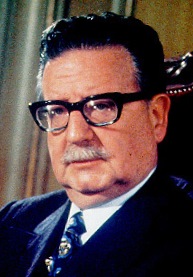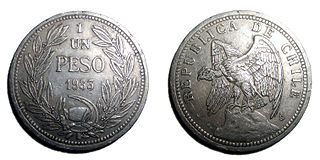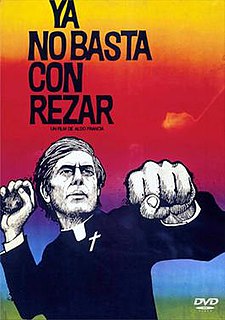 W
WSalvador Allende was the president of Chile from 1970 until his 1973 suicide, and head of the Popular Unity government; he was the first Marxist ever to be elected to the national presidency of a liberal democracy in Latin America. In August 1973 the Chilean Senate declared the Allende administration to be "unlawful," Allende's presidency was ended by a military coup before the end of his term. During Allende's three years, Chile gradually was transitioned from a democratic republic into a Marxist state.
 W
WPresidential elections were held in Chile on 4 September 1970. Salvador Allende of the Popular Unity alliance won a narrow plurality in the public vote, before having his victory confirmed by a Congressional vote after the Christian Democrats voted in favour of his candidacy.
 W
WSalvador Allende, the ex-President of Chile, has inspired a variety of perceptions regarding his policies, personality and performance as a head of state. Around the world, journalists, polling organizations and others have documented the expression of an evolving array of opinions about him. Almost 50 years after his death, Allende remains a controversial figure. Since Allende's death before the end of his presidential term, there has been much speculation as to what Chile would have been like had he been able to remain in power.
 W
WClodomiro Almeyda Medina was a Chilean politician. A leading member of the Socialist Party, served as Minister of Foreign Affairs of Chile from 1970 to 1973 during the Presidency of Salvador Allende.
 W
WThe 1973 Chilean coup d'état was a military coup in Chile that deposed the Popular Unity government of President Salvador Allende. On 11 September 1973, after an extended period of social unrest and political tension between the opposition-controlled Congress and the socialist President, as well as economic war ordered by U.S. President Richard Nixon, a group of military officers led by General Augusto Pinochet seized power in a coup, ending civilian rule.
 W
WThe Chilean land reform was a process of land ownership restructuring that occurred from 1962 to 1973 in different phases. For much of the 20th century agriculture was one of the most backward sectors of Chilean economy. The land reform was initially supported by Chilean right, centre and left political parties plus the Catholic Church and the United States. After the 1973 Chilean coup d'état the ruling right-wing dictatorship initiated a counter-reform that reverted part of it and directed Chilean agriculture into a "neoliberal" model.
 W
WThe Confederation of Democracy was an electoral alliance of center-right Chilean political parties formed in July 1972. Its main purpose was to unite all the opposition parties of the Popular Unity government to face the parliamentary elections on March 1973. Its main objective was to optimize the collection of votes and seats, and accomplish the majority of Congress and thus obtain at least two thirds of the deputies.
 W
WLuis Alberto Corvalán Lepe was a Chilean politician. He served as the general secretary of the Communist Party of Chile (PCCh).
 W
WSofía Ester Cuthbert Chiarleoni was the wife of the Chilean General Carlos Prats, murdered along with him in Argentina by the Dirección de Inteligencia Nacional, within the framework of Operation Condor.
 W
WEnough Praying (Spanish: Ya no basta con rezar) is a 1973 Chilean drama film directed by Aldo Francia.
 W
WMiguel Humberto Enríquez Espinosa was a physician and one founder of the Chilean political party and former left-wing organization Movement of the Revolutionary Left (MIR), founded 1965. He was General Secretary of the MIR between 1967 and his death in 1974.
 W
WMarcos Orlando Letelier del Solar was a Chilean economist, politician and diplomat during the presidency of Salvador Allende. A refugee from the military dictatorship of General Augusto Pinochet, Letelier accepted several academic positions in Washington, D.C. following his exile from Chile. In 1976, agents of Dirección de Inteligencia Nacional (DINA), the Pinochet regime's secret police, assassinated Letelier in Washington via the use of a car bomb. These agents had been working in collaboration with members of the Coordination of United Revolutionary Organizations, a U.S.-sponsored anti-Castro militant group.
 W
WThe nationalization of the Chilean copper industry, commonly described as the Chileanization of copper was the process by which the Chilean government acquired control of the major foreign-owned section of the Chilean copper mining industry. It involved the three huge mines known as 'La Gran Mineria' and three smaller operations. The Chilean-owned smaller copper mines were not affected. The process started under the government of President Carlos Ibáñez del Campo, and culminated during the government of President Salvador Allende, who completed the nationalization. This "act of sovereignty" was the espoused basis for a later international economic boycott, which further isolated Chile from the world economy, worsening the state of political polarization that led to the 1973 Chilean coup d'état.
 W
WThe Popular Unitary Action Movement or MAPU was a small leftist political party in Chile. It was part of the Popular Unity coalition during the government of Salvador Allende. MAPU was repressed during the dictatorship of Augusto Pinochet. In this period, some of its most radical members formed the Movimiento Juvenil Lautaro, whose leaders were political prisoners during the dictatorship and with the return to democracy. Another faction of the former members of the party joined the social democratic Party for Democracy in 1987.
 W
WPopular Unity was a left-wing political alliance in Chile that stood behind the successful candidacy of Salvador Allende for the 1970 Chilean presidential election.
 W
WGeneral Carlos Prats González was a Chilean Army officer and politician. He served as a minister in Salvador Allende's government while Commander-in-chief of the Chilean Army. Immediately after General Augusto Pinochet's September 11, 1973 coup, Prats went into voluntary exile in Argentina. The following year, he and his wife, Sofía Cuthbert, were assassinated in Buenos Aires by a car bomb planted by the Dirección de Inteligencia Nacional.
 W
WProject Cybersyn was a Chilean project from 1971 to 1973 during the presidency of Salvador Allende aimed at constructing a distributed decision support system to aid in the management of the national economy. The project consisted of four modules: an economic simulator, custom software to check factory performance, an operations room, and a national network of telex machines that were linked to one mainframe computer.
 W
WThe Revolutionary Left Movement is a Chilean left-wing political organization and former urban guerrilla organization founded on October 12, 1965. At its height in 1973, the MIR numbered about 10,000 members and associates. The group emerged from various student organizations, mainly from University of Concepción, that had originally been active in the youth organization of the Socialist Party. They established a base of support among the trade unions and shantytowns of Concepción, Santiago, and other cities. Andrés Pascal Allende, a nephew of Salvador Allende, president of Chile from 1970 to 1973, was one of its early leaders. Miguel Enríquez Espinosa was the General Secretary of the party from 1967 until his assassination in 1974 by the DINA.
 W
WGeneral René Schneider Chereau was the commander-in-chief of the Chilean Army at the time of the 1970 Chilean presidential election, when he was assassinated during a botched kidnapping attempt. He coined the doctrine of military-political mutual exclusivity that became known as the Schneider Doctrine.
 W
WThe state visit of Fidel Castro to Chile in 1971 was a landmark event both for Chilean internal politics and for the foreign relations of Cuba. Castro's visit occurred as Chile was experiencing political convulsion amidst the presidency of Salvador Allende who had been elected in 1970. For Cuba it was the first state visit of Fidel Castro since he visited Moscow in 1964 and served to break the diplomatic isolation the country was subject to in Latin America. The state visit was unprecedented as Castro stayed 23 days in the country, travelling it from north to south, and commenting on Chilean politics. Upon arrival to each town and city Castro was usually met by crowds of supporters. His visit ended up making Salvador Allende uncomfortable while the Chilean right-wing exploited it to discredit the Unidad Popular government.
 W
WEl Tanquetazo or El Tancazo of 29 June 1973 was a failed coup attempt in Chile led by Lieutenant Colonel Roberto Souper against the government of Socialist president Salvador Allende. It is named because the rebelling officers primarily used tanks. It was successfully put down by loyal Constitutionalist soldiers led by Army Commander-in-Chief Carlos Prats.
 W
WJosé Tohá González was a Chilean journalist, lawyer, political figure, and Socialist politician.
 W
W"Venceremos" is a Chilean song, which was written by Claudio Iturra and composed by Sergio Ortega for the 1970 election campaign of Salvador Allende. The title translates to "We shall prevail".
 W
WThe Vuskovic Plan was the basis for the economic policy of the Popular Unity (UP) government of Chilean President Salvador Allende. It was drafted by and named after his first Economics Minister Pedro Vuskovic, who had worked before with the CEPAL. Although good results were obtained in 1970, hyperinflation made a comeback in 1972. By 1973, Chile was in shambles – inflation was hundreds of percents, the country had no foreign reserves, and GDP was falling.
Pedro Vuskovic Bravo was a Chilean economist of Croatian descent, political figure, minister and author of the economic plan implemented by Salvador Allende during his government called the Vuskovic plan. His economic policies were used by economists Rudi Dornbusch and Sebastian Edwards to coin the term macroeconomic populism.